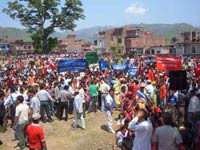Thousands of protesters rally for 6 black teens in Louisiana
Thousands of protesters stormed this tiny central Louisiana town Thursday, rallying against what they see as a double standard of justice for blacks and whites.

But unlike the protests that became landmarks for civil rights when fire hoses and police dogs greeted demonstrators, the rally to support six black teenagers charged in a school fight had a festive yet laid-back air.
"It was a great day," said campaigner Denise Broussard. "I really felt a sense of purpose and commitment, but it was also a lot of fun. I met great people and made some good friends."
The plight of the so-called Jena Six, a group of black teens initially charged with attempted murder in the beating of a white classmate, became a flashpoint for one of the biggest civil rights demonstrations in years.
Old-guard lions like the Revs. Jesse Jackson and Al Sharpton joined scores of college students bused in from across the nation who said they wanted to make a stand for racial equality just as their parents did in the 1950s and '60s.
But while those early protesters dodged police batons and were insulted by the white population, demonstrators on Thursday petted police horses, chatted with officers and posed by the Jena Police Department sign.
"It was a big event for us," said Donna Clark, who traveled from Atlanta with her husband and four young daughters. "We got matching T-shirts and drove all night. It's exciting and I think the girls can say later they were part of history."
People began gathering before dawn; state police put attendance between 15,000 and 20,000, though organizers said the crowd was much larger.
Law enforcement officials said the biggest problem was the heat.
"It's been a very peaceful and happy crowd," said Sgt. Julie Lewis of the Louisiana State Police. "Really these are very, very nice people. They are welcome in Louisiana any time."
The only strident note came at the end of the rally when a group of Black Panthers took the microphone and led the crowd in chants.
"We're nonviolent when people are nonviolent with us," one speaker said. "We're not nonviolent with people that are violent with us."
Jena residents, resentful of the massive protest in their little town and the racist label stamped upon them, were scarce during the demonstrations. Businesses closed, and so did the library, schools, city offices and the courthouse.
"I don't mind them demonstrating," said resident Ricky Coleman, 46, who is white. "I believe in people standing up for what they think is right. But this isn't a racist town. It's a small place and we all get along."
The cause of Thursday's demonstrations dates to August 2006, when a black Jena High School student asked the principal whether blacks could sit under a shade tree that was a frequent gathering place for whites. He was told yes. But nooses appeared in the tree the next day. Three white students were suspended but not criminally prosecuted. LaSalle Parish District Attorney Reed Walters said this week he could find no state law covering the act.
The incident was followed by fights between blacks and whites, and in December a white student, Justin Barker, was knocked unconscious on school grounds. According to court testimony, his face was swollen and bloodied, but he was able to attend a school function that night.
Six black teens were arrested. Five were originally charged with attempted second-degree murder - charges that have since been reduced for four of them. The sixth was booked as a juvenile on sealed charges.
Martin Luther King III, son of the slain civil rights leader, said punishment of some sort may be in order for the six defendants, but "the justice system isn't applied the same to all crimes and all people."
Subscribe to Pravda.Ru Telegram channel, Facebook, RSS!


